Table of Contents
Join Thousands of Hotels Thriving with roommaster
The transition to roommaster is straightforward and efficient. Our implementation team handles data migration including reservations, guest profiles, and historical information.

Hotel market segmentation has become a cornerstone of success in the hospitality industry. The ability to understand and cater to distinct guest preferences is a must if you want to thrive in this business.
79% of hotels struggle to track travel intent and demand. Market segmentation helps you tackle this problem by grouping guests based on travel purpose, booking behavior, and demographics. You can predict demand patterns more accurately and tailor marketing initiatives and offers to each segment. It also helps you price your rooms and inventory with real traveler intent.
With hotel target market segments, you can design experiences that resonate deeply with your guests, boosting loyalty, repeat bookings, and advocacy. That’s why 75% of hotel businesses agree that market segmentation increases their revenues.
This blog explores why hotel market segmentation is indispensable in 2026, providing a lot of knowledge to help your property thrive in the hotel market. You’ll definitely learn how to use the power of segmentation to attract, engage, and delight your guests.
Hotel market segmentation is the process of dividing your potential hotel guests into categories based on shared characteristics, such as travel purpose, preferences, and budget. Instead of a one-size-fits-all approach, hotel guest profiling and segmentation helps you focus on understanding and meeting the unique needs of each segment.
For example, a business traveler might prioritize high-speed Wi-Fi and conference facilities, while a family might look for spacious rooms and kid-friendly amenities.

Some guests travel for work, others for leisure or family time. When you group them based on who they are and how they travel, it’s easier to plan offers, prices, and experiences that actually appeal to them. Here are some common hotel market segments you can use to profile your guests:
This is the simplest way to start with hotel market segmentation. You can categorize guests by age, income, family status, or occupation. For example, families may look for bigger rooms or kids’ meals, while solo business travelers might care more about Wi-Fi and breakfast-to-go options.
The location of your hotel's target market says a lot about how and when they travel. Domestic travelers often book shorter stays and weekend getaways. But international guests usually plan longer trips well in advance. If most of your bookings come from nearby cities, you can promote last-minute deals. But to attract overseas visitors, seasonal campaigns aligned with holiday calendars and travel trends will be the right way to go.
This looks beyond who your guests are and focuses on what they care about. Some travelers seek adventure, others want peace and comfort. When you understand their lifestyle and values, tailoring more personal messages and guest experiences becomes easier.
For example, eco-conscious guests appreciate sustainable amenities and local tours, while wellness-focused travelers may respond better to your spa and yoga packages. Adventure seekers may expect hiking or diving add-ons, while couples might look for private dining and romantic setups. Knowing what motivates each group helps you improve guest experiences, matching their travel goals.
{{guest-app}}
Here, you look at how people actually book and spend. Track patterns like direct bookings vs. bookings from online travel agents, loyalty memberships, and high-spending guests. This helps you reward loyal customers and spot which channels bring in your best bookings.
Not all guests use technology the same way. Some prefer mobile bookings, others still call the front desk. Channel segmentation shows which devices and platforms your guests use. You can remove friction from the distribution channels and make their booking process smoother. It also helps you make communication more effective.
Here’s a quick comparison to help you choose what type of hospitality market segmentation is best for your property:
You may be wondering, “Why would I spend more time on segmenting guests when the existing work pile already keeps me busy?” Here are some benefits why hotel market segmentation is a must:
Understanding guests lets you create experiences that go beyond expectations. Market segmentation gives you the opportunity to direct efforts to specific needs. You can offer family-friendly amenities for parents traveling with children and offer business centers for corporate travelers. These personalized touches leave lasting impressions, offering enhanced guest satisfaction.
Imagine a luxury resort offering a wellness package that includes spa treatments, yoga classes, and healthy dining options, tailored perfectly for wellness travelers. This targeted approach creates a memorable experience that leaves a lasting impression on guests, encouraging them to return.
Market segmentation lets you craft targeted marketing, such as exclusive discounts or perks for specific guest segments. These boosts direct bookings and reduce your reliance on costly online travel agencies.
For example, a boutique hotel might offer a discounted romantic getaway package with complimentary champagne and late check-out for couples. Highlighting such offers on your website or in email campaigns encourages guests to book directly, saving costs and building stronger guest relationships.
Understanding seasonal trends and guest preferences lets you design personalized marketing efforts. When guests see offers, services, and experiences relevant to their preferences, they are more likely to book with you. That’s why studies found that hotels practicing effective market segmentation perform better than their competitors in terms of occupancy.
For example, suppose you run a ski lodge. You could target outdoor enthusiasts with winter activity packages during peak season. You could also promote discounted stays to budget travelers during the off-season.
Segmenting your guests shows you how different types of travelers behave. Some room types fill up faster with families, while couples pick others. Corporate groups often book weeks or months in advance, while free independent travelers may book last minute. Tracking these patterns lets you predict occupancy more accurately, manage inventory, and adjust rates to match real demand.
You can see your most profitable guests, which guests prefer which booking channel. Do they make direct bookings more often or rely on OTAs and corporate portals? This helps you plan promotions around actual trends, reduce empty rooms, and avoid overbooking. When you understand how guest segments' booking patterns, your forecasts become more precise, and your hotel runs smoothly.
Hotel brand segmentation shows which guests are willing to pay more for specific experiences and services. Understanding the differences among target market segments helps you set prices that match what each category is willing to spend.
This approach lets you tailor your pricing strategy for different guest groups. You can adjust rates for premium offerings or special packages based on guest preferences. Pricing according to the actual segment’s demand leads to higher profit margins while keeping your guests satisfied.
Knowing each guest segment helps you maximize revenue and occupancy by tailoring your rooms, services, and marketing. Here are the most common categories you need to understand:
The global business travel market was valued at $1,372.80 billion in 2023 and is expected to reach $2,749.46 billion by 2030, growing at a CAGR of 9.1% from 2024 to 2030. To get your market share in this segment, you must understand what this group expects from hotels.
Common priorities of this segment include:
They expect amenities like high-speed Wi-Fi, well-equipped meeting rooms, smart room features, and express check-in. Central locations near business hubs and airports also appeal to this group.
Business travelers are often less price-sensitive but expect clear value for what they pay. Competitive pricing for meeting packages, flexible stays, and bundled services can make your hotel more attractive to this segment without undercutting revenue. Adjusting rates based on demand patterns, booking channels, and corporate contracts helps you stay profitable while meeting their expectations.
For instance, a hotel targeting corporate guests might offer day-use rooms for meetings and package deals including catering and free shuttle services to nearby conference centers.

For example, Drury Hotels offers attractive perks for corporate guests, such as a credit card rewards program. Plus, corporate groups can get upgrades, add-ons, flexible catering options, and A/V capabilities for their small and mid-sized meetings.
Leisure travelers look for relaxation, entertainment, and memorable experiences. These guests are drawn to amenities like pools, spas, and proximity to attractions. According to reports, Gen Z dominates the leisure travel category. So if they are your target audiences, the age group you must keep in mind is 18 to 28.
You can create themed packages such as “Weekend Escapes” or “Local Adventure Tours,” with guided activities and discounted tickets to nearby attractions. Adding social experiences like group events and workshops can boost your property’s appeal. Highlighting photo-friendly spots and experiences in your listings is also a good idea, since leisure travelers often share their trips online.
Keeping this age group in mind, your offerings should be budget-conscious. However, leisure travelers often are willing to pay for unique experiences. Offering tiered packages, early-bird discounts, and bundled deals with activities can attract this segment.
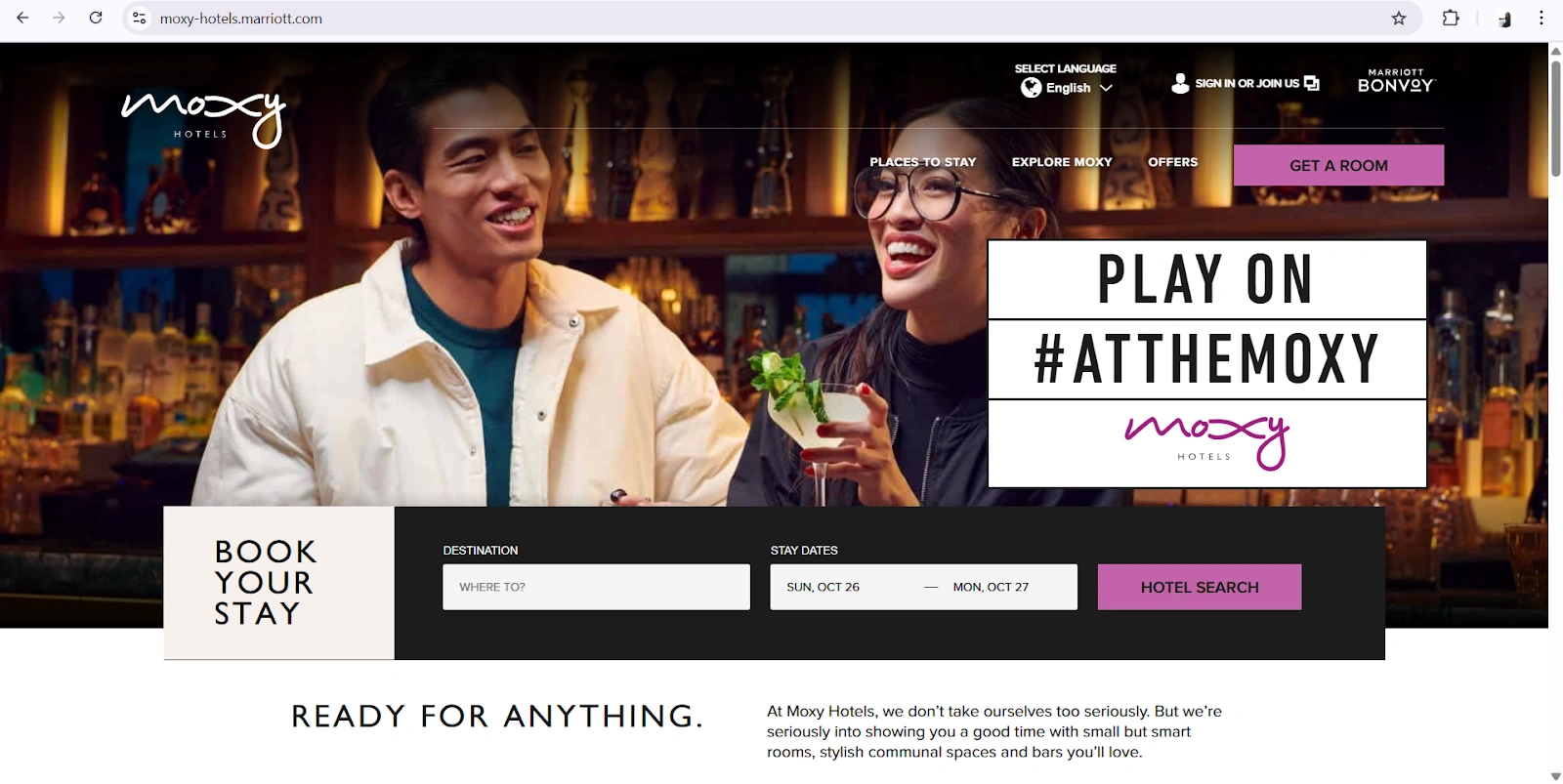
For example, Marriott created an affordable, but stylish and playful hotel brand called Moxy. Perfect for leisure travelers, guests can skip the boring front desk and check in at the bar and enjoy a cocktail instead. The rooms are pet-friendly, perfect for beautiful photos, and feature LED guide lights and walk-in showers. Plus, snacks and beverages are available 24/7.
This segment demands top-notch services, exclusivity, and opulence. Luxury travelers seek personalized experiences, high-end amenities, and unique touches, such as private concierge services, gourmet dining, and bespoke itineraries.
You can appeal to this guest segment with panoramic views, spa treatments, and access to exclusive lounges to meet the expectations of these high-spending guests. Create tailored packages that go beyond standard offerings. Every touchpoint, from check-in to checkout, should reflect attention to detail and a high level of service to make them feel valued and pampered.
Premium pricing works if it aligns with exceptional services and unique experiences. Offering bundled packages, seasonal perks, or loyalty benefits can justify higher rates while reinforcing the hotel’s luxury brand image.

At Woodstock Inn & Resort in Vermont, guests choosing their “Escape & Relax” package receive spa credits, champagne on arrival, and a private tea-time for two in the historic village setting, elevating the stay beyond just a room. They can book Legacy Suites, enjoy farm-to-table cuisine, and take part in activities such as fly fishing and museum tours.
Budget travelers prioritize affordability, cleanliness, and comfort over luxury extras. They often look for simple, reliable stays with clear pricing and essential amenities that meet their needs without added costs. You can attract this group with well-maintained rooms, transparent pricing, and consistent service that delivers on basic expectations.
Consider competitive rates, loyalty discounts, and bundle deals with essentials like breakfast, Wi-Fi, and parking. Offering flexible booking options, loyalty programs, and early-bird promotions also helps draw in this segment. Highlighting your property’s convenience, such as proximity to transit, attractions, and budget-friendly dining options, can make your offer more compelling.
Even small touches like 24/7 reception or quick check-in are a good way to go. Plus, dynamic pricing during off-peak periods and last-minute deals can help you maintain occupancy without cutting into profits.
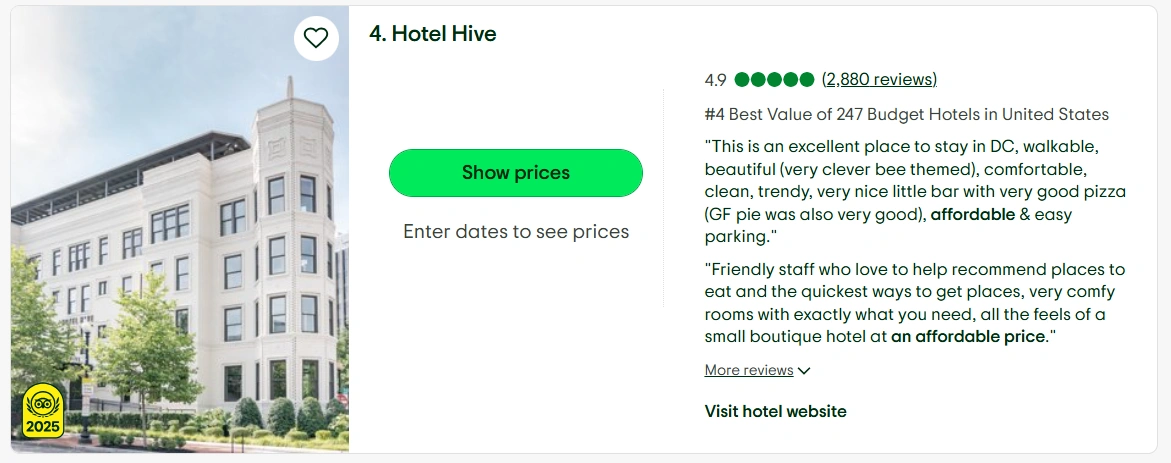
For example, Hotel Hive is a well-loved budget hotel. Guests praise the property’s affordability, cleanliness, and service. The hotel also offers a loyalty program to encourage repeat visits.
The global extended-stay hotel market is projected to reach $98.80 billion by 2030, with a 9.4% CAGR from 2024 to 2030. It’s quite a lucrative opportunity, but this segment’s expectations are a bit different.
Extended stay travelers often need a home away from home. Features like fully equipped kitchens, laundry facilities, and flexible booking terms are key. If you are targeting this category, offer spacious suites with living areas and discounted weekly or monthly rates.
Consider offering Offer tiered pricing for different stay durations, like weekly, biweekly, and monthly. Include discounts to increase direct bookings and keep rates flexible to attract guests staying beyond 30 days.

WoodSpring Suites offers monthly hotel rates. Guests staying 28 nights or more save up to around 44% on their nightly rate. Their fully furnished suites and flexible monthly pricing make it a strong fit for long-term guests.
Sustainability is a growing priority for many guests. 84% of travelers find traveling more sustainably important. 45% even say a sustainability certificate makes a hotel more attractive to them when booking rooms.
Eco-conscious travelers prefer hotels that implement green practices, such as renewable energy usage, waste reduction programs, and locally sourced materials.
You can appeal to this segment by highlighting your green initiatives. Simple steps like refillable toiletries, energy-efficient lighting, or partnerships with local eco-friendly suppliers go a long way. Promote your efforts on your website and booking channels to attract guests who value responsible travel.
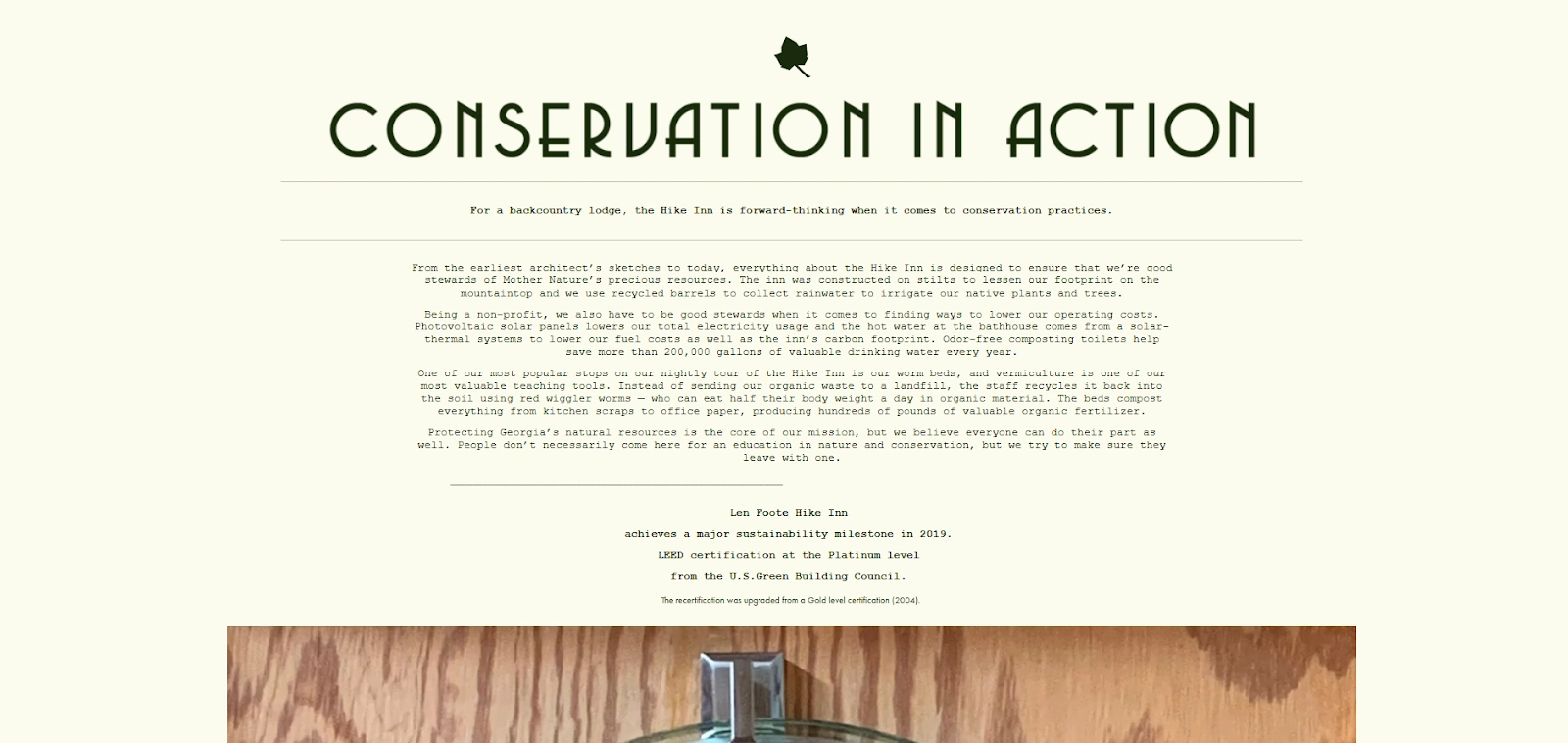
Len Foote Hike Inn in Dawsonville, Georgia, is a LEED-certified eco-lodge accessible only by a 5-mile hike. It operates entirely on solar power, uses composting toilets, and serves meals made from locally sourced ingredients. Guests can enjoy hot showers powered by solar energy and participate in composting programs.
Families and groups look for comfort and convenience. They need enough space to relax and activities that keep everyone entertained. Things like connecting rooms, complementary rooms for big tour groups, kid-friendly pools, and safe play areas really matter.
You can make their stay easier with family packages that include breakfast for kids, group booking discounts, activity packages, and traveler programs. Small touches, like early check-in and bigger dining tables, make a big difference. Highlight nearby attractions and family-friendly amenities to help them plan their stay.
Offer free stays or meals for children under a certain age. Flat rates and discounts for multiple rooms make it easier for groups to book and feel like they’re getting a deal.

Wyndham Lake Buena Vista in Orlando offers a "Kids Eat Free" package that includes daily breakfast for one child aged 10 and under per paying adult. This can save families up to $25 per day. The hotel also provides deluxe accommodations and is conveniently located near Disney Springs, making it a perfect stay for family adventures.
Reports estimate that there are currently 40 million digital nomads, with the market expected to reach around 60 million by 2030. These travelers live and work on the move, blending job with exploration. They look for accommodations that let them be productive without sacrificing comfort or local experiences.
You can appeal to this group with long-term stay options, reliable high-speed Wi-Fi, dedicated workspaces, and quiet areas. Access to laundry and kitchenettes, and flexible check-in and check-out, matter. Nearby cafés, coworking spots, and social spaces also appeal to them.
Offer flexible weekly and monthly rates, include bundled amenities like Wi-Fi and workspace access, and provide discounts for longer stays. Packages that combine accommodation and workspace convenience give digital nomads the simplicity and value they’re looking for
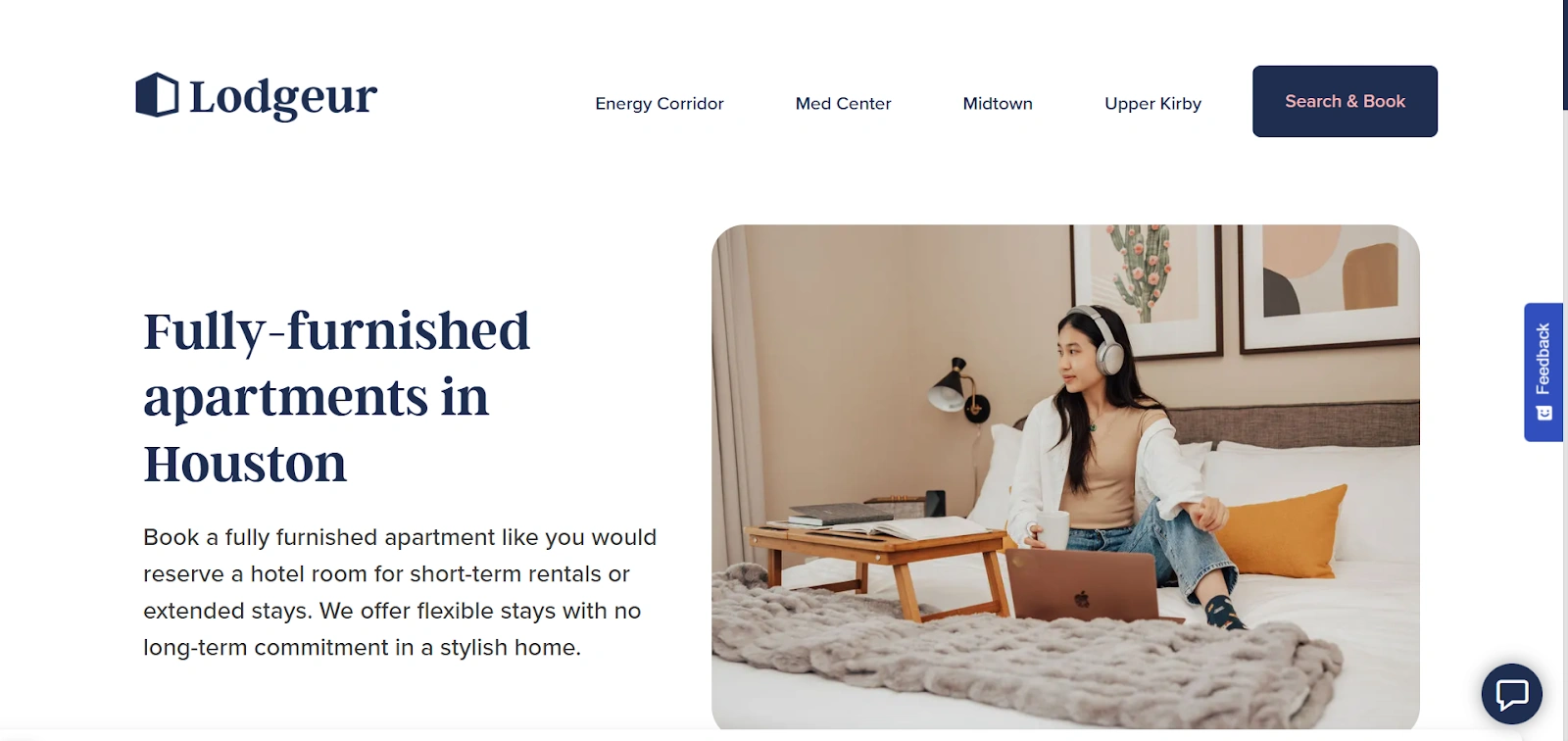
Lodgeur provides luxury apartments in Houston designed for extended stays. Each unit includes comfortable furniture, high-speed internet, and stylish interiors, catering to the needs of digital nomads seeking a home-like environment. The accommodations are professionally managed, ensuring a seamless living experience for remote workers.
Bleisure travelers combine business trips with leisure activities. They often extend their stay to explore the city, dine out, or visit attractions. These guests expect convenience for work and options for relaxation.
You can offer flexible check-in/out, access to business facilities, and curated local experiences and city guides for this hotel market segment. Rooms with workspaces, Wi-Fi, and quiet areas are essential, while weekend packages and local tours can encourage them to extend their stay.
You can provide add-on leisure packages and discounted nights for extended stays. Bundling work-friendly amenities with leisure perks creates perceived value.
Medical tourists travel for healthcare, elective procedures, or wellness treatments. They prioritize proximity to hospitals, specialist services, and comfortable accommodations for recovery.
You can attract this segment by offering shuttle services to medical facilities, extended-stay options, in-room care, and quiet, supportive environments. Clear communication and access to healthcare-related information are also helpful for these guests.
Long-term stay packages with meals and transport to appointments can attract this segment. Offer tiered pricing for private rooms or suites. Packages that simplify logistics appeal to this group segment.
Event and conference guests can be a valuable segment for your hotel. They look for convenience, connectivity, and spaces that make their meetings run smoothly. Being close to event venues and offering reliable business services makes your property more appealing to them.
You can attract this group by providing meeting rooms, fast Wi-Fi, and fully equipped business centers. Offering dedicated event coordinators, AV support, and group booking options helps them plan effortlessly. Bundled packages with catering or tech services can make your hotel their first choice for corporate events.
Create flexible group rates, early-bird discounts, and bundled meeting packages. This not only encourages bookings but can also turn first-time corporate guests into loyal repeat clients.
Here is a comparison table of these hotel market segments to help you understand better:
Not every guest is a good fit for your hotel. The trick is figuring out who fits best, what they care about, and how they like to book. When you know this, you can focus your marketing and services on the people who are most likely to stay and come back. Here is how:
Start by looking closely at what type of guests you are getting the most. Your hotel PMS (property management system) is the best place to pull this data from. Tap into the na,aytics feature and see who books, how long they stay, and what they spend.
Focus on a few key numbers:
These show which types of guests are driving consistent business and which rely on discounts. Once you see your mix clearly, compare it to the overall market demand. If you are underperforming in a high-demand segment, that’s a clear opportunity to adjust your strategy.
{{pms-one}}
High-paying guests don’t always equal high profit. A segment might pay more per night but cost more to serve. So, look beyond ADR and focus on total value.
Find answers to these questions:
When you factor in lifetime value and operational costs, you spot different segments that spend well, require less attention, and come back often. These loyal, low-maintenance guests are the backbone of long-term profitability.
Now that you know which segments work best, give them life. Create a few guest personas that represent your ideal customers. Keep it simple but specific, include a name, age, travel purpose, booking habits, and what matters most to them.
For instance, “Claire, 34, solo business traveler” values quick check-ins, high-speed Wi-Fi, and room service after long meetings. Personas help your entire team visualize who they are serving. From front desk staff to marketing, everyone can tailor experiences that resonate with real people.
Once you have mapped your current mix, check what’s missing. Compare your data to local demand trends and see which target segments aren’t booking with your hotel.
Ask:
Identifying underserved yet profitable groups opens new growth paths. You can tweak your pricing, packages, or online presence to attract them. Filling these gaps helps you diversify and increase revenue and reduce your dependence on a single guest segment.
Now that you know the basics, let’s create an effective hotel market segmentation strategy for your property:
The foundation of any successful segmentation strategy lies in comprehensive research. Start by analyzing data from various sources, such as booking histories, customer feedback, and competitor performance.
Tools like Google Analytics or Customer Relationship Management systems can provide insights into visitor demographics, online behaviors, and booking patterns. You can also use PMS reports to track occupancy and guest demographics, STR data for market benchmarking, and insights from local tourism boards to understand regional trends.
Guest surveys are also invaluable. Here are some questions you can ask:
Combining these sources and insights helps you see booking patterns, anticipate demand, and identify which segments are most valuable to your hotel.
Go beyond surface-level data by exploring your guests’ demographics (age, gender, income) and psychographics (values, interests, lifestyle choices). Some psychographic analysis methods you can use are:
Analyzing these will help you understand motivations, preferences, and expectations. For example, combining demographics and psychographics, you might find that tech-savvy millennials between ages 25 to 35 prefer mobile check-in, eco-friendly amenities, and social spaces, while older, affluent travelers value quiet rooms, premium dining, and personalized concierge services. Segmenting this way lets you tailor offers, messaging, and experiences to each group.
Not all segments are equally valuable. Evaluate each group’s potential by analyzing metrics like spending habits, booking frequency, and lifetime value. This helps you prioritize the specific market segments that contribute most to revenue and have room to grow.
You can calculate segment profitability using a simple formula:
Segment profitability = (Revenue from segment ÷ Total bookings) × 100
For example, luxury travelers might make up only 10% of your bookings but generate 30% of total revenue. This makes them a high-value segment worth focusing on, while budget-conscious travelers may provide steady occupancy but lower margins. Understanding these numbers helps you allocate marketing, services, and packages where they matter most.
Once you have identified and understood your segments, develop effective marketing campaigns tailored to each group.
You should also segment your distribution channels to identify the most popular for each category. For example, business travelers often book through corporate travel portals, direct hotel websites, and travel management companies. Leisure guests prefer OTAs, mobile apps, and direct promotions via hotel websites. Eco-conscious travelers tend to research green credentials online and may book through sustainability-focused travel platforms or direct bookings after verifying eco-practices.
If you run email campaigns, the subject lines should be tailored for each segment, too. For example, you could say “Streamline Your Next Business Trip with Express Check-In” or “Exclusive Meeting Room Packages for Your Team,” as marketing emails to corporate guests.
Tracking how your marketing performs is key to getting results from each segment. Focus on segment-specific KPIs to understand what’s working.
For business travelers, look at conversion rates on corporate bookings, meeting room reservations, and average spend per booking. For leisure guests, track booking rates for packages, tour or activity upsell rates, and repeat visit rates. Eco-conscious travelers can be measured by engagement with sustainability campaigns, direct bookings, and participation in eco-initiatives.
A/B testing is an effective way to refine your approach. You can compare different email subject lines, messaging, images, and special offers to see which drive more bookings. For instance, testing two versions of a weekend getaway email can show which resonates better with leisure guests.
It’s equally important to know when to pivot your marketing strategies. If a campaign underperforms after a few weeks, like low clicks, poor engagement, and weak conversions, adjust your messaging, channels, and offers. Regularly measuring results ensures your campaigns stay relevant, targeted, and profitable for each guest segment.
New tech, changing travel habits, and niche preferences are reshaping how hotel market segments work and how you can serve each group. Here are the biggest trends that are currently evolving your industry:
Artificial intelligence is transforming market segmentation by analyzing guest data at scale to deliver hyper-personalized experiences.
Hotels that adopt AI-powered personalization are better equipped to exceed guest expectations and build loyalty.
Real-time analytics let you to track booking patterns, adjust marketing campaigns, and dynamically update pricing.
For example, roommmaster, powered by ampliphi, analyzes booking patterns, demands, seasonal fluctuations, and upcoming events. This integration also processes your hotel’s past performance, anticipates future demand, and offers rate recommendations to protect your ADR and RevPAR.
Eco-conscious travelers are a growing market segment, and sustainability is becoming a key differentiator.
With mobile devices accounting for the majority of travel bookings, hotels must optimize for mobile engagement.
Embracing these trends ensures that hotels stay competitive while delivering meaningful guest experiences.
For example, roommaster Hotel Guest App offers guests digital keys and check-in flow, property details, directions, and local recommendations.
Hotels are breaking guests into smaller, precise groups based on behavior and preferences. This lets you offer exactly what each person wants. For example, you can suggest spa packages to wellness travelers and adventure tours to thrill-seekers. Personal touches like this make guests feel understood and increase bookings and loyalty. For that, you should:
Pay attention to what your guests are actually saying. Use reviews, surveys, and social media to see what they like and what frustrates them. Acting on this feedback helps you improve services, fix issues fast, and create experiences that keep guests coming back. Plus, it’s also important to:
Manual segmentation can be error-prone and time-consuming. It’s best to use a tool stack to make sure no important guest details get left out.
But what software solutions do you need for hotel market segmentation? Here are some important ones:
A good PMS captures guest details like booking preferences, spending habits, and stay history. This helps you break guests into clear groups, like business travelers, leisure guests, or long-term stays.
For example, if a guest always books spa treatments, you can send them a tailored package for their next visit.
A CRM keeps all guest info in one place so you can personalize offers and marketing. It tracks interactions across emails, bookings, and special requests. For instance, you could send a spa discount to a guest who often books treatments.
Revenue tools let you adjust rates based on demand and what each guest group is willing to pay. For example, offer weekend discounts to budget travelers but maintain premium pricing for luxury guests during peak times.
Analytics platforms turn raw data into insights. You can see which segments are performing best, spot trends, and compare with competitors.
Guest feedback tells you what’s working and what isn’t. Surveys, review aggregation, and NPS tracking give insights you can act on.
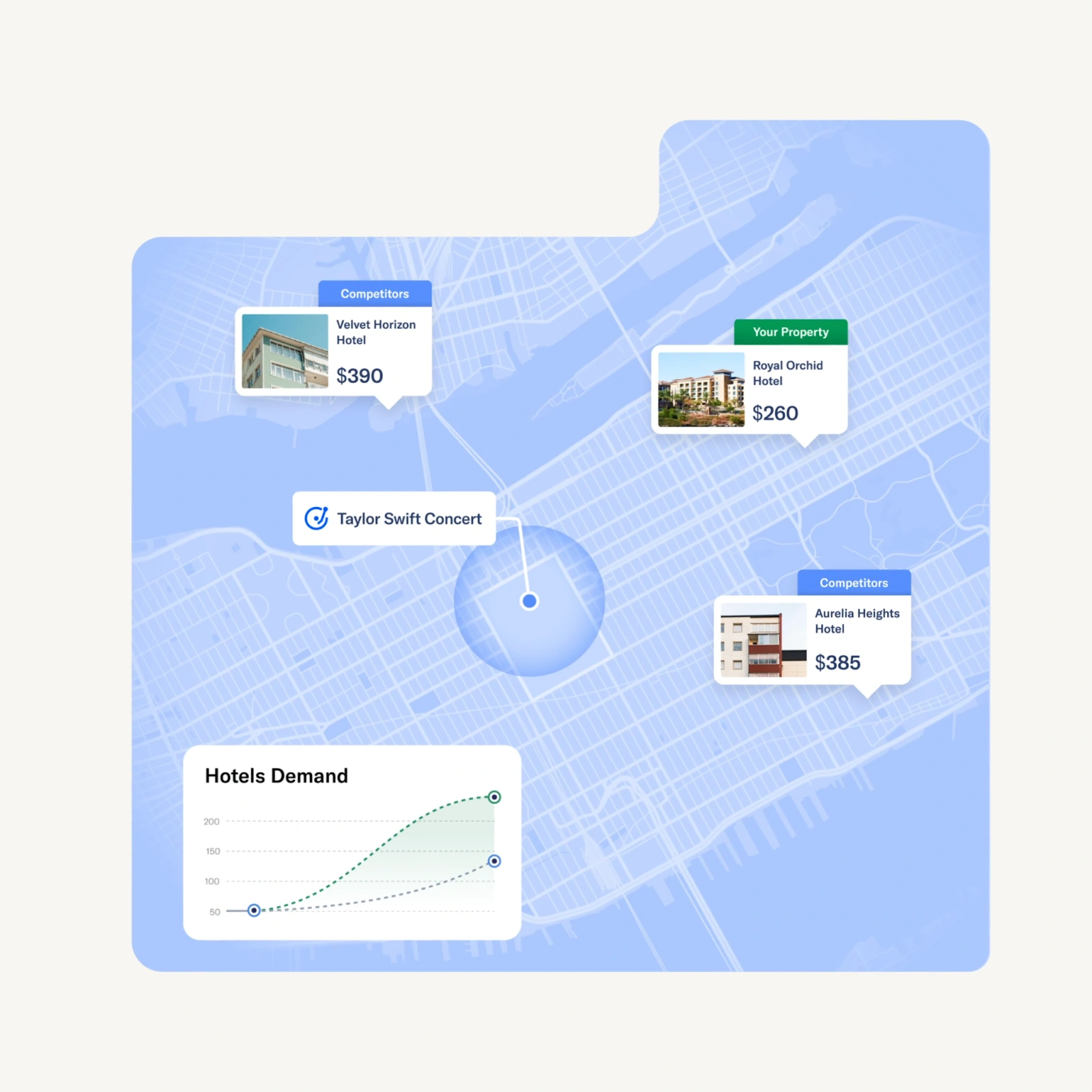
roommaster offers a PMS that makes hotel market segmentation and targeting simple with a clear view of every key performance metric. From occupancy and RevPAR to profit margins and distribution costs, the system pulls live valuable data from your bookings, POS, and accounting tools and calculates metrics automatically.
Powered by ampliphi, roommaster Revenue Management feature monitors booking data, historical patterns, forward availability, competitor pricing, and even cancellation trends. It analyzes past performance, predicts future demand, and provides rate recommendations that protect your ADR and RevPAR.
Based on this analysis, the system suggests the best pricing for your rooms. You can approve recommendations manually or automate dynamic pricing. Updates flow directly into your roommaster Channel Manager, booking engine, and PMS, keeping rates consistent across all channels. No duplicate or incorrect data, ever.
The AI-powered system also learns from your hotel’s performance over time, helping you continually refine your pricing strategies. That’s why hotels using roommaster report a 35% surge in RevPAR, 40% higher ADR, and improved occupancy rate.
“We use all kinds of reports to compare from this time to last year. You can pull future availability, future sales, being on the cloud I would say it has cut our workload like in half. I would definitely recommend roommaster.”
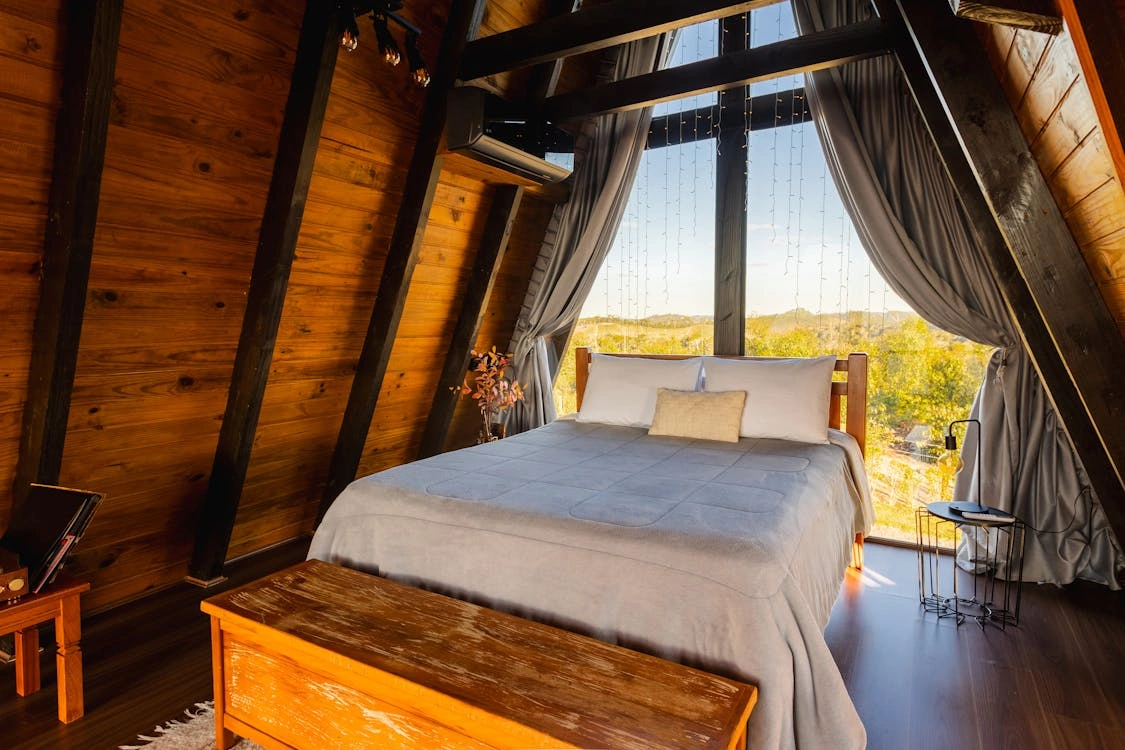
Getting customer segmentation wrong can cost time, revenue, and guest satisfaction. Here are some common hotel market segmentation pitfalls you need to avoid:

Once you have defined and targeted your segments, you must track how well each one performs. Measuring success helps you see what’s working and where to adjust. Focus on these KPIs for each segment:
Tracking these KPIs lets you refine your marketing, pricing, and services to make each segment more profitable and satisfied.
To collect data for hotel segmentation, use multiple sources to understand your guests. Pull stay history, hotel preferences, and booking channels from your PMS and booking engine. Add surveys, feedback forms, and online reviews for opinions and satisfaction. Include external data like STR reports, local tourism boards, and competitor benchmarking to spot trends. Combining these sources gives you a clear picture to create meaningful segments.
The difference between market segmentation and guest personas is that segmentation groups guests by shared traits such as demographics, behavior, and travel purpose. Personas turn relevant market segments into detailed profiles with names, habits, motivations, and preferences. Segmentation tells you who your guests are; personas show why they behave the way and how to tailor offers, messaging, and services for them.
Hotels should review and update their segmentation strategy at least every 6–12 months, or sooner if they notice changes in bookings, demand, or guest expectations. Use fresh PMS data, survey results, and industry reports to refine segments. Regular updates ensure your marketing, pricing, and services stay aligned with current trends and guest needs.
{{cta-strip}}
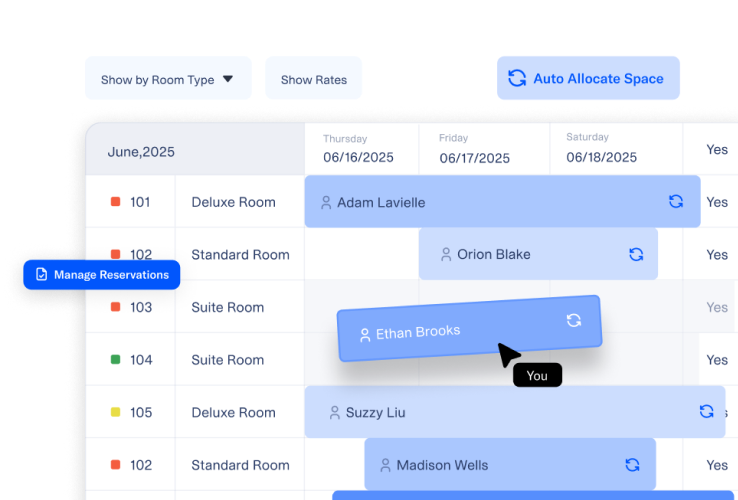
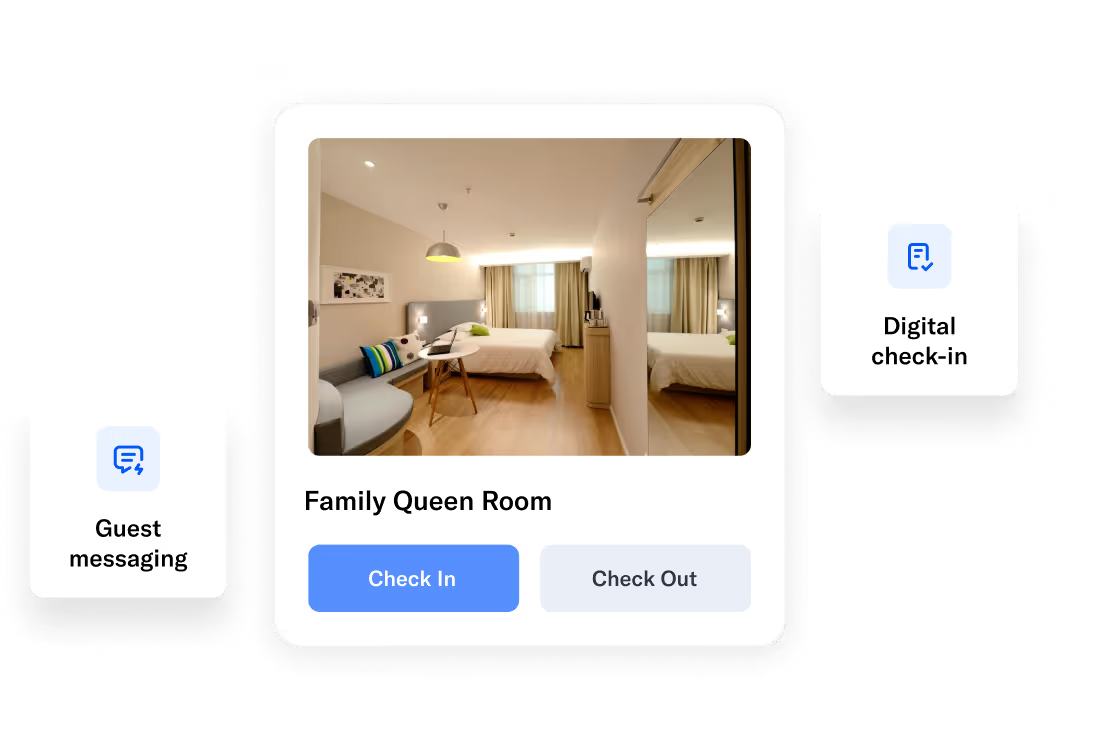
The transition to roommaster is straightforward and efficient. Our implementation team handles data migration including reservations, guest profiles, and historical information.
See how roommaster's unified platform can work for your property. Our team will walk you through features tailored to your specific needs and operations.